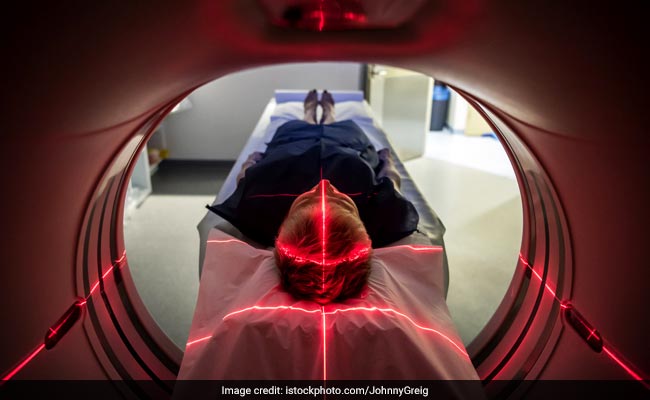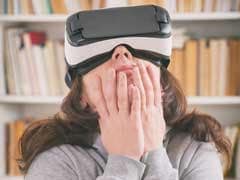Claustrophobia refers to extreme and irrational fear of confined places, like an MRI equipment.

Worrying about the MRI can be enough to set a patient's nerves on edge
HIGHLIGHTS
- Claustrophobia refers to an irrational fear of confined places
- Claustrophobic people may find it dreadful to go through an MRI
- Such fear adds on to their medical condition and may show in MRI scan
The thought of an MRI scanner, a coffinlike, hard-plastic tube with a ceiling just inches above the patient's eyes, has long filled Patrice Mitchell with dread. The 64-year-old freelance editor and former journalist from Rochester, New York, has never been afraid of small spaces such as elevators. But she gets intensely claustrophobic when pulling anything - a sweater, for example - over her face and it gets caught. "If it gets stuck momentarily," she says, "I immediately start to feel quite panicky and feel like I may have trouble breathing."
Short of invasive surgery to probe for suspected cancerous tumors, brain aneurysms, heart problems, abdominal infections and spinal problems, nothing is more effective at unmasking an ailment than cramming a patient into a doughnut-shaped tunnel armed with formidable magnetic imaging capability.
But Mitchell - like many other Americans - has had to come up with coping mechanisms to endure scanning to address years of medical problems and sports-related injuries.
First, there were cervical spine and herniated disc symptoms that landed Mitchell in an MRI scanner in 1992. A decade later, she had scans for worsening headaches and to rule out metastatic breast cancer. Then she had to deal with a shoulder injury in 2013 from too much swimming. And in October, she was back in an MRI scanner for the 11th time - checking for leaks in a breast implant that had been inserted after cancer surgery.
Doctors and radiology specialists use plenty of tricks to try to ease patients' fears, and Mitchell has tried many of them. For her first two scans, her doctor prescribed anti-anxiety medication to calm her nerves. The drugs helped a lot, but Mitchell said she didn't want to become dependent on them to get through an MRI.
Once, a scheduler urged Mitchell to bring along a CD of her favorite music, and the staff arranged to pipe the music into the MRI tube to help her relax. Finally, Mitchell realized that if she simply kept her eyes closed throughout the session, she would be OK or even nod off.
"It helps overall when you have a nice, kind tech who fosters a soothing atmosphere," she said. "Obviously, some are more caring than others, asking you whether you want a blanket or earplugs and keeping up a gentle patter of conversation as they are getting you ready."
The magnetic resonance imaging machine is a superconducting magnet coiled in wire that bounces pulsing radio waves off patients and creates three-dimensional pictures of their anatomy on a computer. MRIs are especially good at creating images of thin slices of the brain, heart, lung, spine and soft tissue; these images can be studied from different angles by radiologists.
Experts say MRIs provide a far more revealing image than an X-ray or CT scan, which use small levels of radiation. MRI scanners rely solely on magnetic imaging and do not emit radiation.
And while there are many "open" MRI scanners on the market that are far less confining and enable patients to look out through openings on the sides of the machines, experts say they aren't nearly as accurate as the "closed" equipment that so unsettled Mitchell.
Some industry advocates of "open" MRIs say that patients with claustrophobia are far better off using one of their products and getting through the scan, even if the machines produce lesser-quality images. Yet generally speaking, closed MRIs are four or five times as powerful as open MRIs, when measured by their magnetic field strength.
"Traditional MRIs - the ones that most people think of being a tube - have always offered the best image quality because they are stronger - they have a stronger magnetic field," said Dennis Agostino, the technical imaging coordinator for Johns Hopkins Health System in Baltimore. "The magnetic field within the scanner is more homogenous. It's smoother, which generally gives a clearer picture."
About 36 million MRI procedures were performed in the United States in 2017, down 8 percent from the previous year, according to a study by IMV, a market research firm.
As many as 5 percent of Americans may suffer from claustrophobia in some form, according to HealthResearchFunding.org, and up to 13 percent of patients who received an MRI reported having a panic attack.
Patients experiencing pain or discomfort may have trouble remaining still on a hard gurney for as long as an hour or more, according to physicians and radiologists. And some are rattled by the incessant banging sound created by the pulsating magnetic coils.
Sian L. Spurney, a Washington internist, said that over the years several of her patients have panicked after being eased into an MRI tunnel and tried to crawl out. "I think people who have that intense claustrophobic reaction feel like they are being buried alive," she said.
"It's hard to predict who is going to have a bad experience," Spurney said. "It's embarrassing for patients, and it often jams up the schedule for other MRIs."
Simply worrying about the MRI in advance of the procedure can be enough to set a patient's nerves on edge. And fear of what serious medical problems the imaging might reveal significantly adds to the anxiety.
"There's a percentage of the population that flat-out will not be able to get an MRI, just because the claustrophobia is so intense," said Mike Skok, a senior executive at Providian Medical Equipment, an Ohio company that specializes in new and refurbished MRI equipment. "So those folks just can't get scanned."
(This story has not been edited by NDTV staff and is auto-generated from a syndicated feed.)
DoctorNDTV is the one stop site for all your health needs providing the most credible health information, health news and tips with expert advice on healthy living, diet plans, informative videos etc. You can get the most relevant and accurate info you need about health problems like diabetes, cancer, pregnancy, HIV and AIDS, weight loss and many other lifestyle diseases. We have a panel of over 350 experts who help us develop content by giving their valuable inputs and bringing to us the latest in the world of healthcare.














